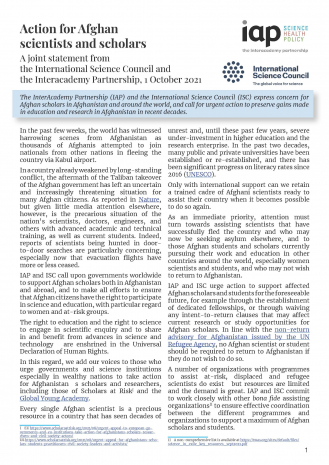The InterAcademy Partnership (IAP) and the International Science Council (ISC) call upon governments worldwide to support Afghan scholars both in Afghanistan and abroad, and to make all efforts to ensure that Afghan citizens have the right to participate in science and education, with particular regard to women and at-risk groups.
The right to education and the right to science to engage in scientific enquiry and to share in and benefit from advances in science and technology are enshrined in the Universal Declaration of Human Rights. In this regard, we add our voices to those who urge governments and science institutions especially in wealthy nations to take action for Afghanistan's scholars and researchers, including those of Scholars at Risk and the Global Young Academy.
Every single Afghan scientist is a precious resource in a country that has seen decades of unrest and, until these past few years, severe under-investment in higher education and the research enterprise. In the past two decades, many public and private universities have been established or re-established, and there has been significant progress on literacy rates since 2016 (UNESCO).
Only with international support can we retain a trained cadre of Afghani scientists ready to assist their country when it becomes possible to do so again. As an immediate priority, attention must turn towards assisting scientists that have successfully fled the country and who may now be seeking asylum elsewhere, and to those Afghan students and scholars currently pursuing their work and education in other countries around the world, especially women scientists and students, and who may not wish to return to Afghanistan.
IAP and ISC urge action to support affected Afghan scholars and students for the foreseeable future, for example through the establishment of dedicated fellowships, or through waiving any intent-to-return clauses that may affect current research or study opportunities for Afghan scholars. In line with the non-return advisory for Afghanistan issued by the UN Refugee Agency, no Afghan scientist or student should be required to return to Afghanistan if they do not wish to do so. A number of organizations with programmes to assist at-risk, displaced and refugee scientists do exist but resources are limited and the demand is great.
IAP and ISC commit to work closely with other bona fide assisting organizations to ensure effective coordination between the different programmes and organizations to support a maximum of Afghan scholars and students.
Rad the full joint communiqué Action for Afghan scientists and scholars.


